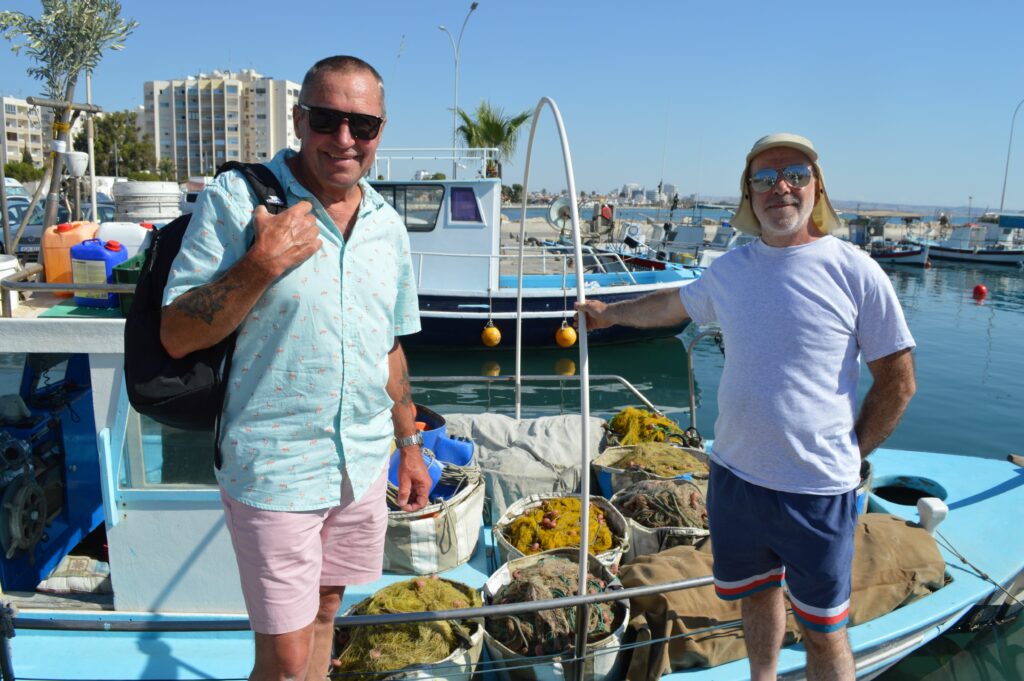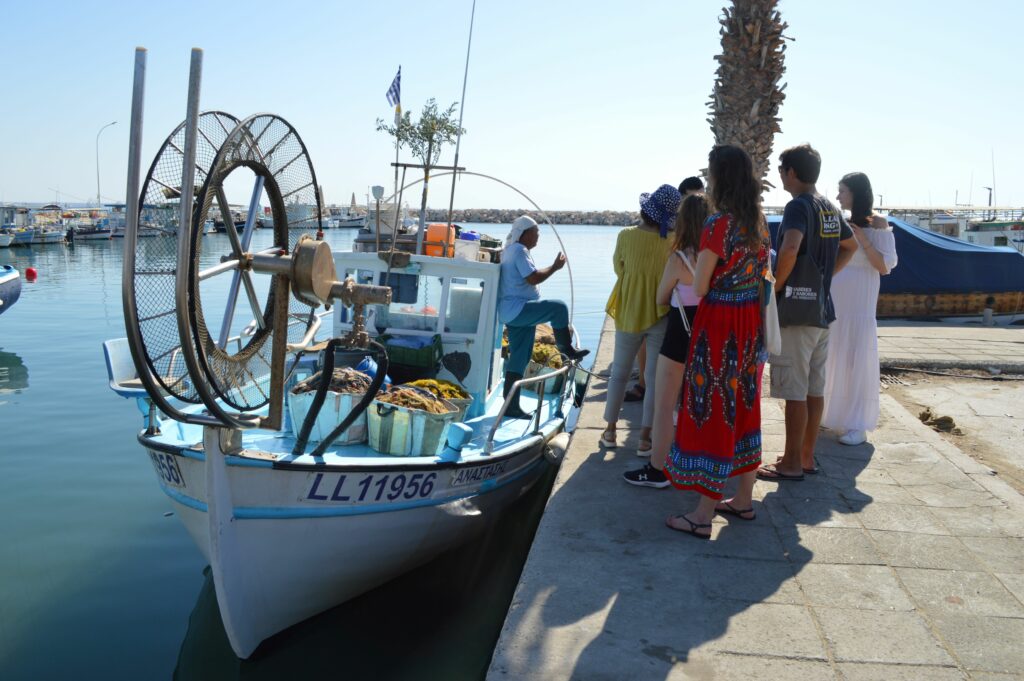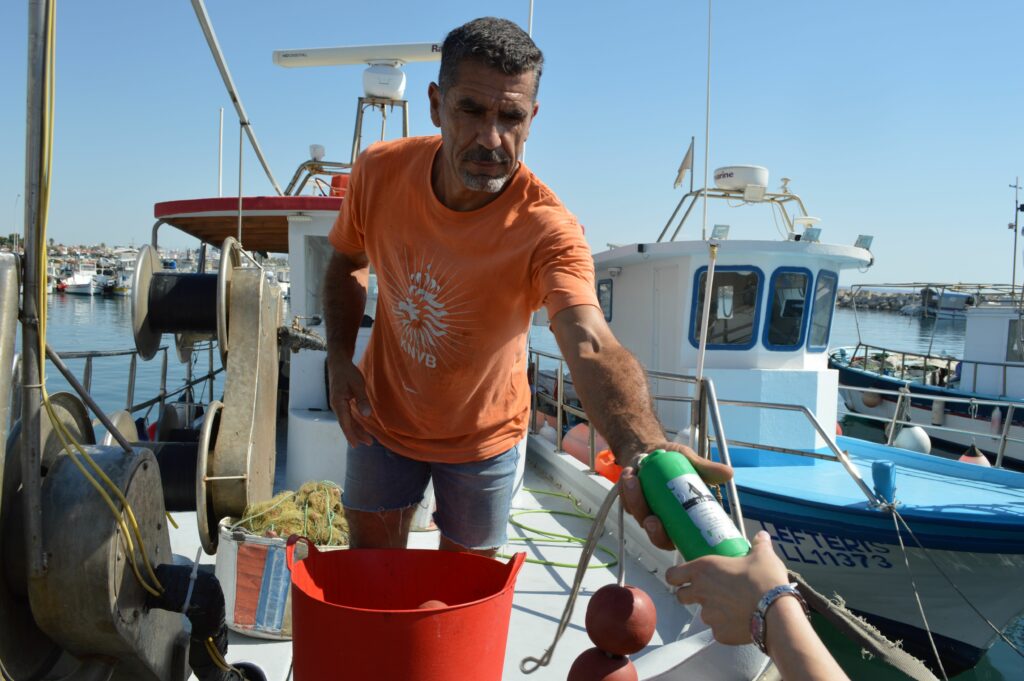

Funding from the Company’s Fisheries Charitable Trust has enabled two fishers involved in Clean Catch, a UK Government-funded programme championing collaboration to mitigate bycatch of sensitive marine species, to attend a regional small-scale fisheries symposium in Cyprus alongside programme staff to share their experiences.

Will Shugg and Barry Preston, who both work out of Mevagissey Harbour in Cornwall, travelled to Cyprus to attend a regional small-scale fisheries (SSF) symposium over 1–3 July. They were joined by two staff from the Clean Catch programme, Alessandra Bielli (Cefas) and Chantal Lyons (Mindfully Wired Communications).
Clean Catch champions collaboration to minimise and, where possible, eliminate the bycatch of sensitive marine species – including cetaceans, seals, seabirds, sharks, skates, and rays. The programme also seeks to share knowledge on bycatch mitigation globally. Established in 2019 to support the UK Government’s ambitions on bycatch in its waters, one of the programme’s key activities has been a trial led by Cefas in Southwest England to test measures for preventing the bycatch of common dolphin and harbour porpoise a small-scale gillnet fishery. The trial set out to determine the effectiveness of LED lights and two different models of pinger in reducing cetacean bycatch, as well as how feasible they are for fishers to use on a daily basis. “Pingers” are small devices that attach to nets and emit pulses of sound designed to alert cetaceans to the presence of the nets and so prevent their entanglement; with the lights also intended to make the nets more visible.
Fishers Shugg and Preston have been involved in Clean Catch’s work from the beginning, with their feedback used to make necessary modifications to the trial over time. They spoke about their experiences of taking part in Clean Catch at the first SSF Regional Symposium for Europe, named ‘Hope Spots, Bright Spots’ and organised by IUEM/UBO and TBTI Global. The event brought together researchers, campaigners, lawyers, and others from across Europe to explore ways to support small scale fishers to thrive. Local Cypriot fishermen took part in discussions and, on the second day of the symposium, hosted attendees at the quayside to showcase their catches, including red mullet, scorpionfish, and invasive lionfish, caught using gillnets and trammel nets. The fishers also highlighted the significant challenges they face such as invasive species and competition from illegal recreational fishing.

‘I really felt for the Cypriot fishermen,’ said Shugg. ‘But it was heartwarming that all these people at the symposium were coming together and wanting to help small scale fishers.’
Preston echoed Shugg’s words, saying ‘It’s an experience I’ll never forget. I’m glad I witnessed it.’
Other symposium attendees noted how valuable it was to listen to the Cornish and Cypriot fishermen exchanging their experiences and knowledge, with Shugg and Preston being the only fishers present across the full three days of the event. The fishermen found plenty of common ground, including on the use of pingers to keep dolphins away from nets – even if the motivation in the case of the Cypriots was to prevent their catches being taken, while Shugg and Preston were more focused on preventing dolphins from becoming entangled. As with many other bycatch mitigation measures, there was wide recognition at the symposium that the usefulness of pingers is fishery-dependent.

Shugg and Preston continue to work with Clean Catch on the cetacean bycatch mitigation trial, which was paused to enable an evaluation of the design and is due to resume this summer with an extra seven skippers from across three Cornish ports joining. As part of the redesign, LED lights and one of the models of pinger will not be tested as Shugg and Preston found them to be impractical, preferring Fishtek Marine’s Banana pinger. Clean Catch will also establish a second bycatch monitoring and mitigation trial with a fishery partner elsewhere in England in 2025. The trial will focus on one or more species groups including seabirds, seals, sharks, skates, and rays. Clean Catch is currently seeking expressions of interest from fisheries who wish to be involved in the trial to contribute to efforts to protect marine ecosystems and enhance the sustainability and reputation of UK seafood.
Gavin O’Donnell, The Company’s Charities Communications Manager, commented: “The Fishmongers’ Company is committed to supporting a sustainable future for the UK fishing industry, working collaboratively for solutions that benefit both fishers and the marine environment. We are delighted to have funded this exchange. We look forward to seeing the continued progress of the Clean Catch programme and a healthier future for fisheries in the Southwest and the UK more widely.”